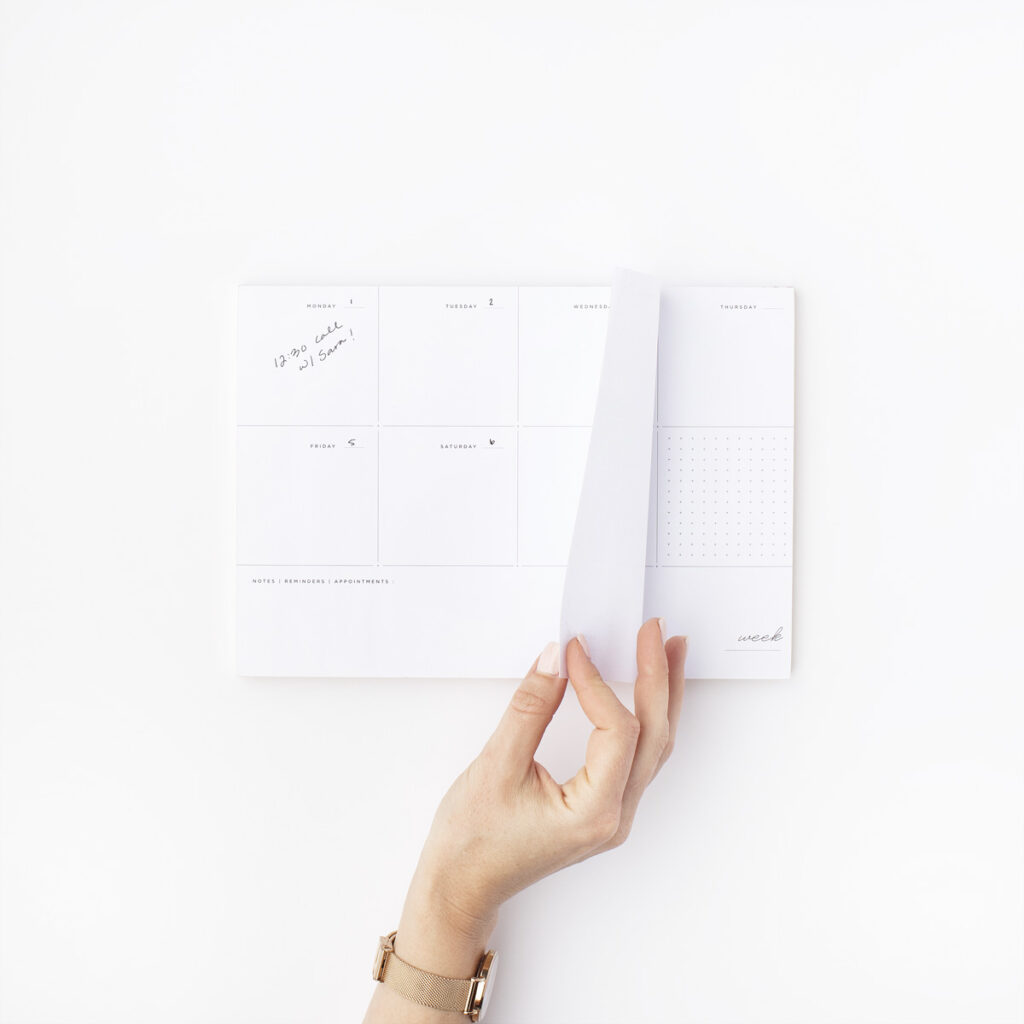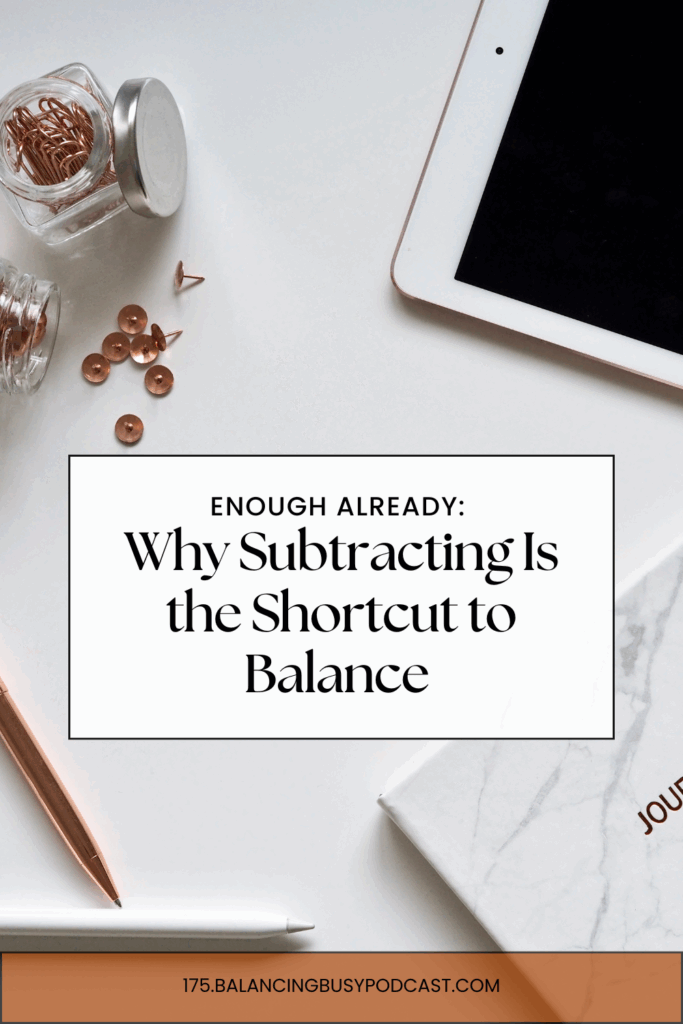Do you feel like you’re constantly adding more to your to-do list, your schedule, and your life—but it’s only leaving you more overwhelmed?
What if the real solution wasn’t doing more… but doing less?
In this summer encore episode of the Balancing Busy podcast, I sit down with Leidy Klotz, a professor of engineering and architecture at the University of Virginia and author of Subtract: The Untapped Science of Less. Together, we explore why our brains are wired to keep adding and how learning to subtract can simplify your life, amplify your joy, and create the space you’re craving.
This conversation is packed with research-backed insights and practical strategies to help you:
✅ Break free from the “do more” trap
✅ Simplify your business and life (without guilt)
✅ Recognize what’s really essential—and release the rest
✅ Build a life that feels balanced, spacious, and deeply fulfilling
If you’ve ever felt like you’re drowning in busyness, this episode is your reminder that balance isn’t about adding more—it’s about choosing less.
🎧 Listen now and start subtracting your way to a calmer, more intentional life.
✨ About Leidy Klotz

Leidy Klotz is the author of Subtract and a professor at the University of Virginia. Leidy studies the science of design, which, he reminds us, is something we all do every day.
Before becoming a professor, Leidy designed schools in New Jersey and before that he played professional soccer.
🔗 Learn more about Leidy and his work:
Get the book: Subtract: The Untapped Science of Less
Website: https://www.leidyklotz.com
X: @leidyklotz
The Instinct to Add
Leidy kicks off the conversation by addressing a common phenomenon: our tendency to add rather than subtract. He shares a personal anecdote about playing Legos with his son, highlighting how we often default to thinking about what we can add to improve a situation. This instinct, he argues, can hinder us from considering subtraction as a viable and effective option.
What does it look like to practice subtraction
An important distinction to make when you want to start the practice of subtracting is the way you think about it. It’s not lazy to want to eliminate certain things in our lives. We want to subtract and make room in our lives to do better, to have a bigger impact. Whether that impact is in our businesses or in our home life, the intention is for fulfillment.
When you are clear on what your goals are, you gain clarity on the things that can be subtracted.

Impact Over Busyness
Let’s talk about the cultural glorification of busyness and the subconscious link between being busy and feeling valuable. Leidy emphasizes the importance of aligning our activities with our goals, particularly the goal of making a meaningful impact. Subtraction, in this context, becomes a strategic tool for enhancing our effectiveness and achieving our desired outcomes.
Subtraction in real life
There are some areas of our life that may be easier than others to practice subtraction. Leidy shared that he is able to practice subtraction with ease when it comes to physical items; he is good at subtracting in work life, but when it comes to parenting and home life, he struggles. I’m going to guess that is where a lot of you do too! His reasoning was that as adults and parents, because we are capable of doing a lot of things, naturally we think we should be doing every single thing. It becomes more difficult to weigh which things are most important because they all feel important. And when everything is important, it’s almost impossible to subtract. Instead, we find ourselves continuing to add.
I have found that sometimes the thing I need to subtract is ME! When I handed off dinner to a meal plan service and the prep to each of my three kids (I talk about this all the time), it changed the dinner game for our family. Family dinner is important to me, and I thought I had to be the one to make it happen. By taking myself out of the equation, it actually made it MORE possible!
We can also subtract in parenting and home life by delegating and by allowing our kids to be bored. This was a huge one for me too. When we subtract ourselves and allow our kids to step up to the plate, they get to experience things on their own and end up feeling really proud of themselves. So it is a win for everyone!

Optimize Your Day Using Subtraction
Get in the habit of asking yourself, “Could I subtract here?” whenever you are feeling overwhelmed.
You might also want to use a different word. The word subtract can have a negative feel to it and you might find yourself not feeling connected or inspired by it. Instead of focusing on the subtraction and what you are taking away, you focus on the positive and what are you gaining. Words like carve, reveal, clean, etc. I liked using the word reveal. What am I able to reveal when there is less?
As we navigate our busy lives, it’s essential to challenge the default instinct to add and consider the untapped potential of subtracting. Whether in our professional pursuits, personal lives, or parenting, the science of subtraction offers a fresh perspective on achieving greater impact with intentional and strategic choices.
Sometimes, less truly is more, and subtraction might be the missing piece in our quest for a purposeful and fulfilling life.

Links You Need:
Balanced Home Blueprint — this is how I keep my house clean, running smoothly (with clean laundry for all), and dinner keeps showing up on the table!
Other Episodes You’ll Love:
Episode 47: 10 (Simple) Ways To Sneak In More Time
Episode 22: Keeping a Clean Home When You Don’t Have Time with Becky from Clean Mama
Episode 158: Mary, Martha, and Me: Lessons On Balance, Overwhelm, and What Matters Most

you said: